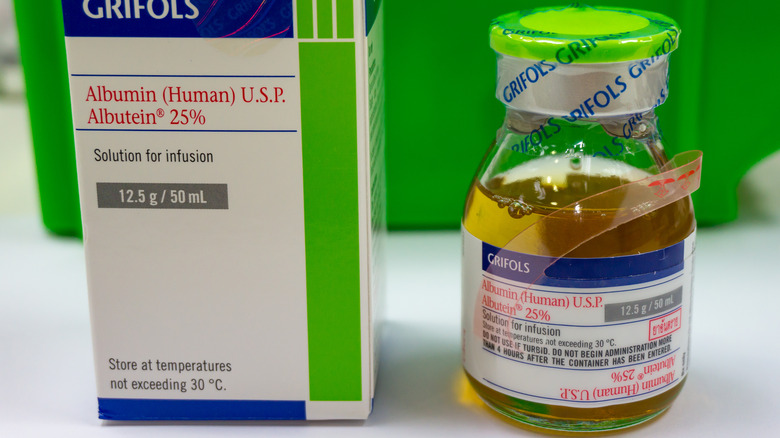What It Means When Your Albumin Is Low
About 55% of your blood comprises plasma, which carries various nutrients, proteins, and hormones to different body parts (via News Medical). Albumin represents half of the total protein in your plasma, making it the most abundant, according to a 2022 article published in StatPearls. Even though the liver synthesizes albumin, many of these proteins enter the bloodstream, per the source. In the bloodstream, albumin helps carry hormones, vitamins, and enzymes throughout the body and keeps fluid from leaking out of your blood vessels into other tissues, says Medline Plus.
Since albumin supports various functions, your body needs a certain amount for optimal functioning. According to the University of California San Francisco, the normal range is between 3.4 to 5.4 grams per deciliter (34 to 54 grams per liter). Abnormally low levels are known as hypoalbuminemia. According to the Cleveland Clinic, hypoalbuminemia is associated with various medical conditions, some of which are critical and life-threatening. Although anyone can have this condition, it mostly affects people aged 70 years and over.
What causes hypoalbuminemia
According to Healthline, inflammation, vitamin deficiency, and malnutrition as a few common causes of hypoalbuminemia. However, the condition also has more serious causes like liver disease (or cirrhosis). According to a 2012 study published in the journal Critical Care, most people with advanced cirrhosis develop hypoalbuminemia. It often stems from a decreased synthesis by the hepatocytes and sodium and water retention, diluting your body's albumin content.
Hypoalbuminemia is also common in people with congestive heart failure. A 2020 study published in the Journal of Thoracic Disease says albumin deficiency in people with congestive heart failure increases mortality risk, rehospitalization, and aggravation.
Hypoalbuminemia is also linked to nephrotic syndrome — a group of symptoms associated with bad kidney function (via the National Institute of Diabetes and Digestive and Kidney Diseases). According to the center, kidneys have millions of filtering units called nephrons. With the aid of the glomerulus — which is a filter — and a tubule, blood can be filtered to remove waste and extra water, which comes out as urine. Nephrotic syndrome happens when your glomeruli are inflamed, causing the excess protein to leak into your urine from your blood.
Treatment of hypoalbuminemia
If you think you have hypoalbuminemia, you should consult your doctor for an effective diagnosis. Your doctor might order a serum albumin test to analyze your albumin levels in a laboratory, according to Healthline. They may also recommend a microalbuminuria test or a C-reactive protein test to determine how much protein leaks from your urine, per Healthline. The results of your diagnosis will determine the treatment route.
Your doctor may recommend protein-rich foods like nuts, eggs, and dairy products if your diagnosis confirms that malnutrition is behind your low albumin levels, per Healthline. However, if your hypoalbuminemia is linked to heart failure or kidney disease, you may be prescribed blood pressure medications or be prepared for dialysis (via the Cleveland Clinic). If your hypoalbuminemia is caused by liver disease, your doctor might recommend lifestyle changes like cutting back on alcohol to help restore normal albumin levels (via Medical News Today).
Injecting albumin intravenously is another treatment option for people with severe injuries, infections, or pancreatitis that can't be quickly reversed, says the Mayo Clinic. Injections can also work better for people who don't register improvements after taking nutritional protein supplements, per the clinic. Albuked-25 vial is one example of these drugs, per WebMD. This drug might come with side effects. Therefore, it's crucial to follow your doctor's prescriptions for safe and effective treatment.
Generally speaking, serious cases of hypoalbuminemia will require continuous assessment and hospitalization might be necessary, according to Medical News Today.



